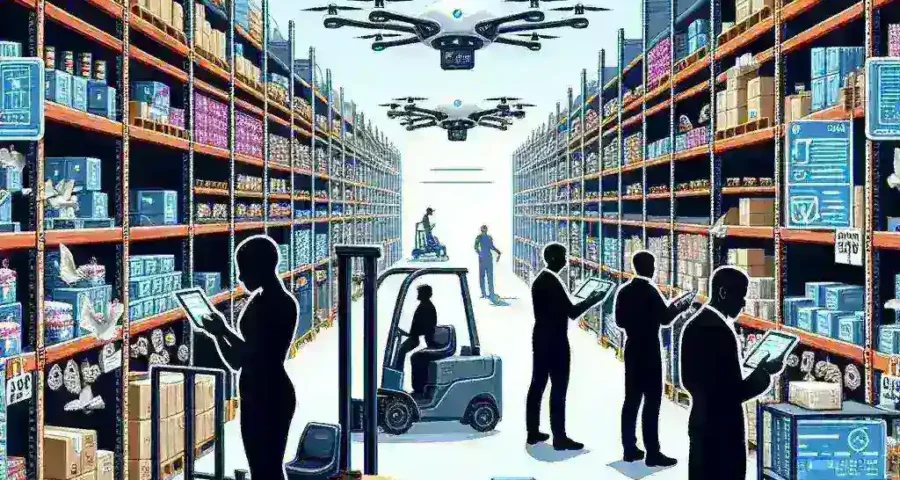Introduction
In recent years, the retail industry has witnessed a technological revolution, with companies constantly seeking innovative solutions to enhance operational efficiency and streamline processes. One such development is Target’s testing of AI guided inventory drones within its U.S. distribution centers. This article delves into the implications of this cutting-edge technology, exploring its potential benefits, challenges, and future prospects.
The Rise of Drones in Inventory Management
Inventory management is a critical aspect of retail operations, directly influencing stock levels, customer satisfaction, and ultimately, profitability. Traditional methods of inventory counting are labor-intensive and prone to human error. Drones, equipped with advanced AI technology, offer a promising alternative. These unmanned aerial vehicles (UAVs) can autonomously navigate through vast distribution centers, quickly and accurately scanning products to ensure that inventory records remain up to date.
Historical Context of Drone Use in Retail
The concept of using drones in retail isn’t entirely new. Amazon has long been at the forefront of drone delivery discussions, but the application of drones for inventory management is a relatively unexplored territory. As retail giants like Target begin to embrace this technology, it signifies a pivotal moment in the industry.
Target’s Initiative: A Step Towards Automation
Target’s initiative to test AI guided inventory drones aligns with its broader strategy of leveraging technology to enhance operational efficiency. By automating inventory management processes, Target aims to minimize human error, reduce labor costs, and ultimately improve service delivery to customers.
The Technology Behind AI Guided Drones
The drones deployed by Target are equipped with sophisticated AI algorithms that enable them to identify, categorize, and locate products autonomously. Utilizing advanced sensors and cameras, these drones can effectively navigate complex warehouse environments and gather real-time data on inventory levels.
Benefits of Using AI Guided Drones
- Increased Efficiency: Drones can conduct inventory checks significantly faster than human workers, reducing the time required for stock management.
- Enhanced Accuracy: AI technology minimizes human error, resulting in more accurate inventory records.
- Cost Savings: Reducing the labor force needed for inventory management can lead to substantial cost savings in the long run.
- Real-time Data Collection: Drones can provide real-time insights into inventory levels, allowing for quicker decision-making.
Potential Challenges and Considerations
While the deployment of drones presents numerous advantages, it also poses certain challenges that must be addressed:
- Regulatory Issues: The use of drones in commercial settings is subject to various regulations that may impact their deployment.
- Technical Limitations: Drones may encounter difficulties navigating complex warehouse layouts or operating in low-light conditions.
- Employee Concerns: The introduction of automated systems may lead to job displacement, raising ethical concerns.
Case Studies: Real-world Applications
Target’s initiative is not an isolated case; various retailers are exploring similar technologies. For example, Walmart has implemented drone technology for inventory management in select locations, showcasing its potential impact on logistics and supply chain operations.
Expert Opinions
Industry experts believe that the successful integration of AI guided inventory drones could revolutionize the retail landscape. According to Dr. Sarah Thompson, a leading expert in supply chain management, “The use of drones represents a significant leap forward in how retailers manage their inventory. It not only enhances efficiency but also aligns with the growing demand for automation in retail operations.”
The Future of AI Guided Drones in Retail
As Target continues to test and refine its AI drone technology, the future appears promising. The potential for widespread adoption of drones in inventory management could lead to a transformation in how retailers operate:
- Broader Adoption: If Target’s trials prove successful, other retailers may follow suit.
- Technological Advancements: Continued investment in drone technology will likely lead to more sophisticated systems capable of handling complex tasks.
- Integration with Other Technologies: AI drones could be integrated with other technologies, such as the Internet of Things (IoT), to create a more interconnected retail ecosystem.
Conclusion
Target’s testing of AI guided inventory drones is a significant step toward revolutionizing inventory management in the retail sector. By embracing this technology, Target aims to enhance operational efficiency, improve accuracy, and ultimately provide better service to its customers. As the industry evolves, it will be fascinating to observe how these advancements shape the future of retail logistics.


Leave a Reply